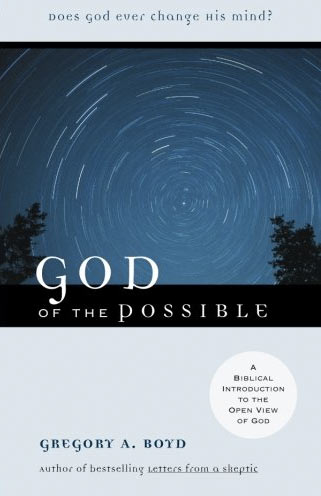God of the Possible: A Biblical Introduction to the Open View of God
 Author: Gregory A. Boyd
Author: Gregory A. Boyd
Publisher: Baker (2000)
Topic: Theology: What is Open Theism, why do some embrace it and how do Open Theists respond to objections?
Buy on Amazon
Description: This exceptionally engaging and biblically centered text defends a theological claim that is generating heated controversy among evangelicals. The Open view of God holds that the future is partly open, for it includes possibilities as well as settled realities. Since God is omniscient and knows reality perfectly, God knows the future partly as a domain of possibilities. Boyd, [former] professor of theology at Bethel College (St. Paul, Minn.) and author of Letters from a Skeptic and God at War, displays a remarkable ability to make “open theism” accessible to a wide audience.
Open theism usually receives a cool reception among evangelical theologians, whose views of divine foreknowledge often echo Augustine, Aquinas and Calvin, as well as Hellenistic philosophical theology. This classical tradition interprets God’s perfection as eternal changelessness, ruling out the possibility that God’s intentions could change. Boyd sidesteps the more obtuse theological debates surrounding this issue in favor of a patient, but not pedantic, exposition of a “motif of future openness” in the biblical narrative. These biblical texts repeatedly portray God as changing plans in response to human decisions, viewing future events as contingent and even being disappointed at how events turn out. Boyd clearly believes the debate over open theism has gotten off to an unfortunate start, as disagreements about the “settledness” of the future have unnecessarily been interpreted as challenges to God’s omniscience or sovereignty. This convincing, clear book promises to raise the caliber of argument in the controversy.
Greg’s story behind the writing of God of the Possible. For a variety of reasons, mostly related to Scripture, I came to the conclusion that the future was partly open between 1984 and 1986. I knew this view was unusual. Indeed, I didn’t know any other evangelicals who held to it. But I didn’t think it all that significant. It seemed to me to simply be a way of making Arminianism logically and biblically more consistent.
I was quite surprised, therefore, to find myself in 1996 faced with a petition signed by more than a hundred pastors calling for me to be fired from Bethel College for teaching heresy! For two years straight the annual convention of the Baptist General Conference (which owns Bethel) was focused on determining whether I should or should not be allowed to teach at Bethel — and thus, whether Open Theism was or was not “heresy.”
One of the things that surprised me — and, frankly, discouraged me — was the level of misunderstanding most people had about the Open View. Among other things, I was repeatedly accused of being a “process theologian,” of “denying God’s omniscience,” of “denying God’s omnipotence,” and of “putting philosophy before biblical authority.” At some point I started putting my responses to these charges to paper so I wouldn’t have to keep repeating myself. In the process of doing this, I began recording every verse in the Bible that seemed to me to support an open view of the future. My goal was to make my view as simple and as biblically compelling as possible.
By the time the storm subsided a little (the opposition didn’t succeed in getting me fired, by the way), I found I had created a little book on Open Theism. Since all the published material on Open Theism was up to this point rather academic, I concluded that my little book might fill a niche. And this is how God of the Possible came to be written and published.
